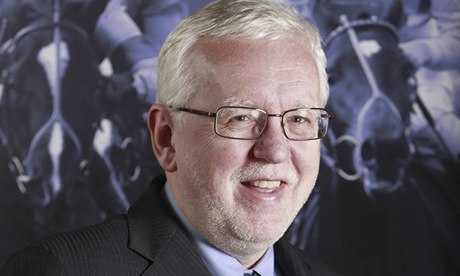 The chief executive of bookmaker William Hill has closed his public Twitter account after a bizarre Saturday night row between himself and campaigners against high-speed, high-stake betting terminals.
The chief executive of bookmaker William Hill has closed his public Twitter account after a bizarre Saturday night row between himself and campaigners against high-speed, high-stake betting terminals.Ralph Topping, the four-decade betting veteran who says he “never forgives” an insult, got involved in a heated discussion on social media between his public affairs manager, Andrew Lyman, and the Campaign for Fairer Gambling 10 days ago over the fixed odds betting machines.
In an argument over the merits of a Daily Mail article headlined “Gambling’s crack cocaine” about “betting machines that enslave the poor and earn bookies BILLIONS”, Topping popped up to claim that his “uncle died in WW2 for freedom. He would (twirl) in his overseas grave at its restriction. Died for honesty. Great value to die for”.
In increasingly intemperate exchanges Topping – who was paid £1.9m last year – accused campaigners of hiding the source of their funding.
He claimed they might have “success fees” tied to running down the industry. The campaign was set up and is funded by multimillionaire former poker player Derek Webb.
Topping asked one campaigner, Adrian Parkinson, whether he was “shifty” when he worked as a bookie. In the seven hours of tit-for-tat exchanges others joined the fray – including Tom Watson, the former Labour chairman who has 137,000 followers on Twitter, who asked Topping to remove his public affairs manager from his post.
A few days later Topping took his account private – and his tweets disappeared from public view.
The online spat took place just before the prime minister expressed sympathy with Ed Miliband’s attack on the proliferation of fixed-odds betting terminals (FOBTs), which critics claims is a cause of gambling addiction and lead to crime. The terminals allow punters to bet up to £100 every 20 seconds on casino games.
For the industry the machines are a vital revenue stream, representing a quarter of William Hill’s earnings. Across the industry gross profit from FOBTs is now £1.5bn, up from £1.3bn in 2010, with bookies clustering in poorer areas.
The stakes could not be higher. If politicians acted to reduce the maximum stake from its current limit of £100, Barclays calculated that William Hill’s group pre-tax profit for 2015 would be a third lower than under the current regime.
The same analysis said cutting the number of permitted FOBTs per shop from four to three would lop 10% off William Hill’s 2015 pre-tax profit.
Parkinson, from the Campaign for Fairer Gambling, said: “Topping’s Twitter explosion highlights the extent to which even experienced industry figures like him have now lost sight of what a betting shop is and are determined at all costs to maintain an addictive high-revenue product that has turned shops into mini high street casinos.”
William Hill spokeswoman Kate Miller said “it was a reasoned debate that is commonplace on social media. He was raising questions about the campaigner’s funding. Ralph Topping took his account private because he is travelling.”









